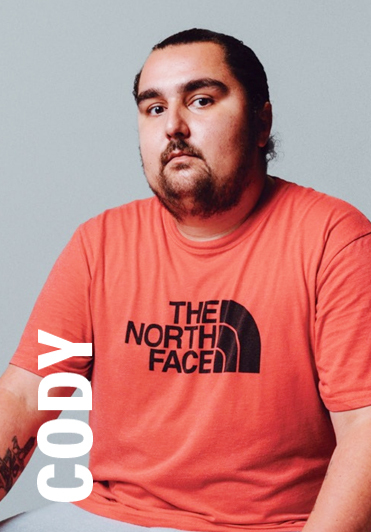
My name is Cody. I am 26 years old and was born in Belleville. My Aboriginal ancestry derives from Tyendinaga Mohawk Territory. I was raised in Trenton and had a great childhood as my parents always worked hard. I was given the opportunity to play on many different hockey and soccer teams with my brother. I made the local rep hockey team and played from the time I was five to 12.
After Grade 6, I had to change schools, and it was at this point that I was introduced to marijuana. This is when my life started to take a turn – I started smoking and selling marijuana. This seemed to lead me down a path of trouble. I was in and out of youth facilities and youth jail throughout my teenager years. I became a dad at 15 and had my second child at 17. At 18, I continued to make the wrong choices. My criminal activity landed me in adult provincial jail – drug trafficking escalated from marijuana to more serious drugs. By the time I was in my early 20s, I had been arrested numerous times and found myself in and out of custody. At the age of 23, I was arrested for trafficking and carrying a gun. I was sentenced to nine years in the federal penitentiary. I completed the required programs, was granted day parole and transitioned to Sagatay.
I wanted more than anything to change my life and live legit, but after living my whole teenage and adult life on the wrong side of the law, I wasn’t sure how I was going to get there. I came to Sagatay not knowing what to expect. I was given a curfew and was told that as long as I was able to abide by that, it would increase over time. I was very happy with the support I got from the staff of Sagatay, and I completed my three months of the mandatory life-skills program. During this time, I was able to obtain all of my ID, and opened my very first bank account. I finally felt like my life was starting to head in the right direction. I was advised that there was an Apprentice Program through Centennial College that I could apply to. I did just that and had an interview. Only having street and jail experience, this was something that made me pretty nervous, but I was excited to hear that I was accepted.
I am currently attending Centennial College in the Electrician Program, and my goal is to continue to grow as a person. I hope to work my way up to being a Master Electrician and eventually own my own business one day. I wish that I had found this path sooner, but what I have gone through has made me the person I am today. I am very grateful for this path that brought me to Sagatay, which has given me legitimate goals to strive for.
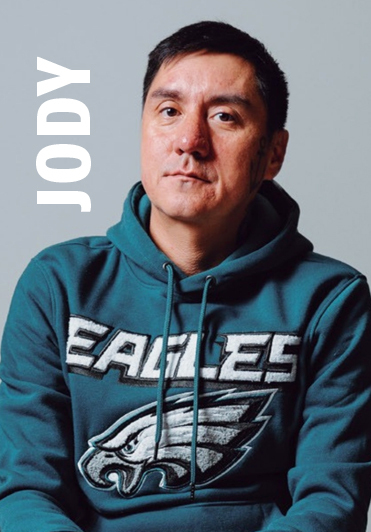
My name is Jody, and I am from the Oneida of the Thames Reservation.
I moved to Toronto from London, Ontario, when I was 19 years old with my then girlfriend. I felt that I was leaving my old life behind. In reality, I was running from and burying childhood trauma.
I attended college for about a year, but became very isolated as my girlfriend was attending school elsewhere. It wasn’t long before I started drinking after work, and soon I was a full-time working alcoholic. After 11 years together, my then fiancée and I split up, and I was lost. I dove deep into drugs and alcohol while working in the Bar/Restaurant industry.
After over 15 years of couch surfing, multiple failed relationships, living in and out of shelters, and severe drug and alcohol use, I came to the realization that I needed help. I had been running from my culture for so long; I was ready to help myself. By then I was living at Na-Me-Res, and I approached the Oshkabaywis John Roy and asked for his advice. He asked if I was ready to commit to the Sagatay Program, and helped me meet and greet the Sagatay team. I applied and was accepted.
I was determined to make the best of this opportunity, and I have. I get up and put my best foot forward every day. I started weekly therapy and volunteered at The Stop’s Farmers’ Market as well as working for the Sagatay Job Training Program on the weekends. I then applied for a job opening and I now hold a full-time position with The Stop Community Food Centre. With the help and support I found at Na-Me-Res and Sagatay, I am proud to say that I am a success story, and I hope to inspire everyone and anyone who wishes to help themselves. I am living proof that it is never too late to turn your situation or life around.
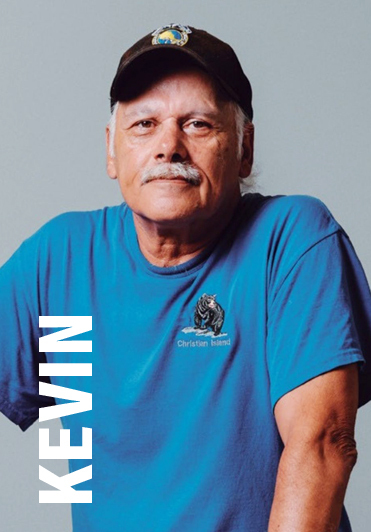
My name is Kevin from Beausoleil First Nation, which rests on the southern tip of Georgian Bay on Christian, Beckwith and Hope Islands located in Simcoe County. I am a Chippewa/Ojibway and a ’60s Scoop survivor.
When I came to Toronto, I did not have a place to stay and was homeless, couch-surfing and dealing with anger issues. I heard about Na-Me-Res and how it serves the Indigenous community, so I decided to reach out.
The support that staff helped me with the most was being referred to a therapist and dealing with my anger management. I am still connected to the therapist; this support has been great and has helped me see the bigger picture. The greatest opportunity from Na-Me-Res was getting me housed and having my own place to call home. Having a permanent place to live has given me a sense of stability and security, which reduced my stress and anxiety. It provided me with a predictable environment where I can establish routines and make plans for the future.
My accomplishments while staying at Na-Me-Res were learning to stay out of trouble, better time management skills, social connections, and finding out more about my culture. I participated in most of the life-skills programming, which helped me to work with others and be part of a community.
There needs to be more organizations like Na-Me-Res in the community. The support has been a beacon of hope, and I wanted to express my gratitude for the support, generosity and kindness that has made an impact on me, which I truly appreciate!
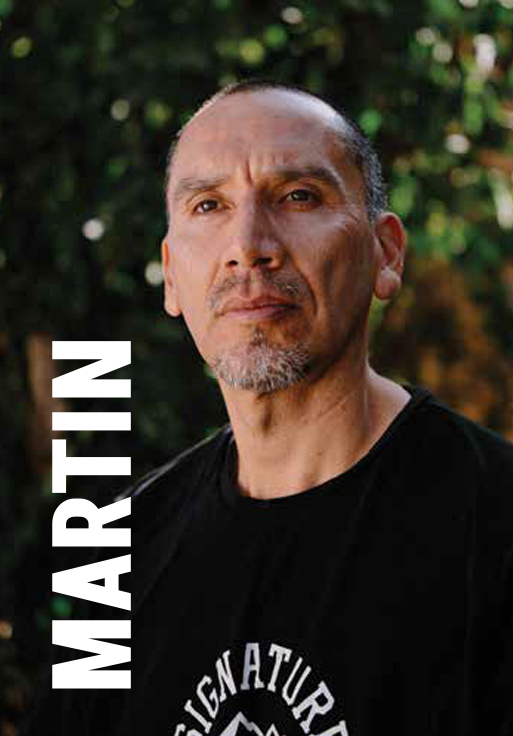
I am a ’60s Scoop Survivor; both my mother and father are Residential School Survivors. I was placed in foster care at the age of four and was placed in five or six foster homes before being adopted at the age of nine. I was brought to Ontario and adopted in Sarnia in 1981.
My family is a very loving and caring family, but due to personal issues that were not attended to and/or resolved, I ended up leaving at the age of 16, becoming a resident of a boys’ home in Sarnia called The Inn of the Good Shepherd, where I aged out at 19.
I was living in Brampton at the time and was transitioning to Toronto. I did not have a place to stay/residency in place and had to stay with a friend for a short while. I looked into support programs for the general public, and while doing an online search, came across Na-Me-Res. I realized it was specifically for Indigenous men and hoped I would be accepted. I came in and spoke with an Intake Worker and was accepted into the program.
I was working full-time, so I was not able to participate in many of the programs which NaMe-Res offered, but did attend the Healing Circle. The Healing Circle was helpful in many aspects of life. I was dealing with relationship issues, cultural issues and other personal issues which had occurred throughout my life. The Healing Circle was the most helpful in terms of emotional and psychological support. The other support system in place which helped me was the Indigenous Rapid Housing Program, which assisted me in securing an apartment. For the most part, I was dealing with emotional, psychological and relationship issues. Fortunately, I do not suffer or have any addiction issues. During my stay at Na-Me-Res, I was able to deal with some of my emotional, psychological and relationship issues through attending the Healing Circles.
I was also able to secure multiple jobs and become more financially stable. I cannot give NaMe-Res enough credit and appreciation for all they helped me with. It was a time which allowed me to heal and refocus my efforts to where they should be applied. With Na-Me-Res’ help, I was able to regain stability and focus. Since March 2, 2020, I have secured employment as an assistant to a home inspector and as a superintendent of three buildings, where I am on call 24 hours, and I have also become a better father to my children.
I would like to express that more programs such as Na-Me-Res are needed in the community for people such as myself, whether it be for transitioning of location, or because mental or addiction issues are needed. I also cannot express my true gratitude as to the service and care of all who work at Na-Me-Res.
My future endeavours are to return to Na-MeRes and be able to give back to the community and the very entity (Na-Me-Res) which has been instrumental in my success story.
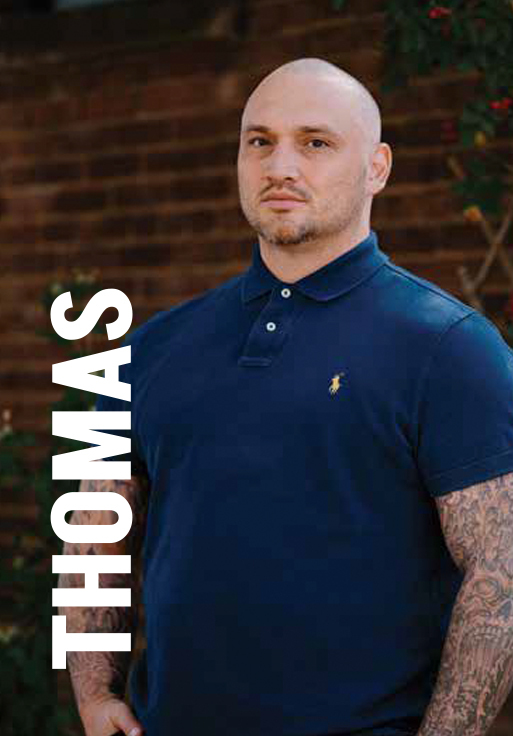
I was a troubled kid, on the streets at 14. In and out of jail, on probation my whole teenage years. Been part of the system since age 13. Living independently, couch surfing, I got involved with street gangs as a young teen. I was initiated into my first gang at 14. I started out involved with petty crimes before graduating to drugs and guns. By the time I was 36 I came to the realization that I needed to change my life and get away from gangs and addiction. I moved across the country and found my way to Sagatay.
After being interviewed and accepted into the program, I moved in just before Christmas and just before the arrival of COVID-19 changed the world. I really found myself gravitating toward a more spiritual life. I was able to connect with Indigenous resources in the community which helped me to heal physically, emotionally and spiritually.
At Sagatay I was able to spend time with people from other Indigenous cultures and share in an exchange of cultural knowledge.
As valuable as my time spent here was, I left after finishing my whole year to pursue a spiritual quest. I learned a lot about myself during that time and kept learning about controlling my emotions and finding joy in the simple things, even in the shadow of COVID. After a year and a half of this journey of personal discovery, I learned so much about colonization in Canada that I was ready to focus on a new beginning and join the fight for justice.
I reapplied to Sagatay and was lucky enough to be accepted. I came back transformed and embraced the changes that had taken place in the program while I was away, taking advantage of the opportunity to further my education. I have been much more active and confident at the Big Drum during drum circles, singing leads and encouraging others. I am more in tune with my spirituality and have taken care of my physical health, completing physio. I have also abstained from drugs and alcohol the whole time I have spent at Sagatay.
All around, this place has helped me out beyond my dreams. Being able to conquer my addictions and get away from things that were holding me back has truly been transitional. Finding a place where I felt comfortable asking for help has changed me for the better
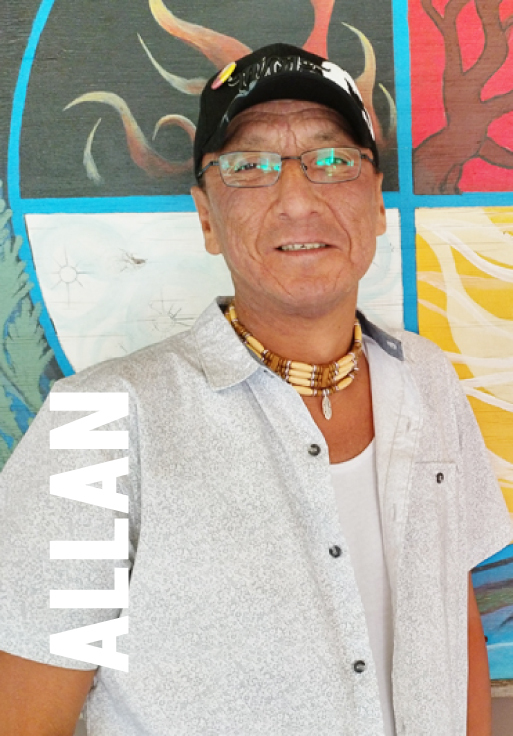
Allan is Cree and a member of the wolf clan. He is from the Attawapiskat First Nation in northern Ontario. He grew up in Cochrane, living in and out of foster care. He is a survivor of sexual abuse and started drinking at fourteen. His high school years were a mixture of good grades and escalating addictions. By the time Allan was eighteen, he was living on the streets.
At twenty, he went to live with his mother, got a job, and then his own place. He then relapsed, lost his home, and ended up living in the woods. Allan hit rock bottom last year after finding himself in the hospital in Thunder Bay. The issue was serious, the withdrawal was intense, and he called his brother for help. He got him a one-way ticket to go live with him. His brother told him about Na-Me-Res. He was accepted and has stayed clean & sober. He is now living at Sagatay and taking programs to learn skills and self-care. He is re-learning about his culture with drumming, smudging, the garden, the plants, the circles, and the sacred fire.
“Na-Me-Res has been giving me strength, hope, and self-esteem. I wouldn’t change anything about what I am going through now.”
Allan is now taking the Community and Health Care Worker program with Anishnawbe Health Toronto. He is learning about community training and working in the food bank kitchen. His goal is to go to college and become a social worker. To give back to the community and to return home to Attawapiskat First Nation.

Chris is Anishnaabe/Ojibway and originally from Wiikwemikoong Unceded Territory, with ties to M’Chigeeng/West Bay and Sagamok Anishnawbek. Parts of his family are residential school survivors. Another part is chiefs and warriors. His mother wanted to get her family into a new environment and moved to Peterborough when Chris was a young child.
At an early age, Chris fell in love with hockey. It was everything to him. As he got older, it became too expensive for his mother, who was a single parent and at times struggled with alcoholism. He had to stop playing. Chris lost focus, grew angry, and without strong guidance, dropped out of high school. This was followed by more choices that led to a dark
place. It got to the point where he was sent to live in a youth shelter. Not long after, Chris was dealing drugs, got caught, and was incarcerated for a short while. It was the best thing to happen. With no desire to return to prison or that lifestyle, he started to clean up and rehabilitate himself.
He was able to reconnect with his culture through pow wow, singing, dancing, and building community. This new way of life opened Chris up to possibilities. He always had an interest in acting and storytelling. He made a plan and was accepted into the Centre for Indigenous Theatre in Toronto. He then went on to the prestigious National Theatre School
of Canada in Montreal. After six years in school, moving back to Ontario with no money and nowhere to stay, he was accepted into Na-Me-Res. He graduated to Sagatay and then to permanent housing at the Homewood property.
“They gave me hope and a welcoming home. The language classes, the drumming, the pow-wow, the life skills classes. It is more than a place to stay. You are given the tools, the discipline, and cultural connection to live a better life. It’s like your North Star.”
Today Chris is in his first year of the Birmingham Conservatory at the Stratford Festival. He hopes to stay with The Festival and pursue storytelling on their stages, as well as writing and sharing his own stories.

Moe is Ojibway and a member of the bear clan. He grew up in Toronto. When Moe was six and a half, his father was murdered, and he learned he was adopted. He had no idea he was an orphan. He spent the rest of his childhood in CAS care living in six foster homes while suffering from abuse. When he was old enough – Moe hit the streets.
He was in a dark place while mourning the death of his mother. One late night the Na-Me-Res outreach van appeared and brought him to the shelter. He sobered up a while and started talking with the elders – little by little. He learned to smudge and began taking sweats.
“I didn't know where home was. I was an orphan and didn't know. I had no sense of family or what it was supposed to be. I am really grateful for Na-Me-Res has helped me a lot.”
Moe has been living in his own place in Etobicoke for the last sixteen years. It is a quiet home away from any trouble. To this day, Na-Me-Res provides a sense of purpose and spirituality. He smudges daily, has his feathers, and participates in rain dance ceremonies.
The cycle has been broken. Now his greatest hope is to meet his adult children, who he had to give up as a young man.
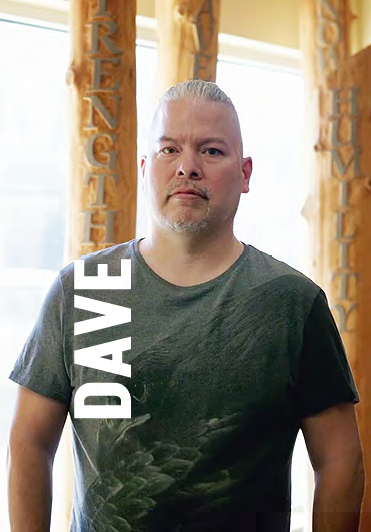
Dave is Ojibway and was born in Sault Saint Marie. When he was five years old, a fire killed his two brothers, and his sister died in a car accident. His Mom moved with him to Toronto. They lived in Regent Park, and he went to St. Paul’s school. He started causing trouble and was often in jail.
When he was 21, he had his first son. He turned his life around, started his own business, and stayed out of jail for 11 years. After going through a divorce, he turned back to drugs and alcohol. Things went downhill, and he is now just picking up the pieces.
Dave heard about Na-Me-Res when he was incarcerated. He applied and was accepted but only lasted three weeks. He returned to jail. Five years later, he was welcomed back and is now in transitional housing at Sagatay.
“If you don’t dig deep, it’s not going to work. I just started caring. I was tired of letting my kids dow. It is so good for indigenous men to have. I am so grateful for the opportunity.”
Dave has always worked in construction and works today building custom office furniture. His goals are to hold down the same job, find a place to live, stay clean, stay happy and never give up.
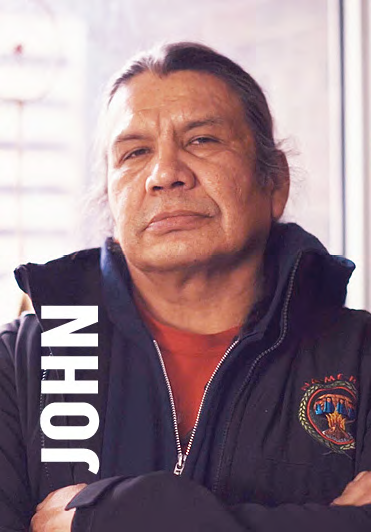
John grew up on Manitoulin Island. As a young man, he moved to Toronto and lived in a foster home. He only spoke Ojibwe at the time. After some time, he moved back home as his mother finally got a house to get all her children back. In returning home, he felt like an outsider. He was always getting into trouble and went back to the city.
As a young man, he would go back and forth from jail with short stays. When released, he had no family and nowhere to go. Tired of a life of struggle, he got a job in construction. With no home, he slept in the park. John learned about Na-Me-Res and called every day to get into the shelter. When he was accepted, it was a turning point.
“It was the cultural and spiritual aspect. That is what got me. It was real. It is a way of life. It isn’t just on Sundays.”
He started requesting teachings, and it helped a lot. He would occasionally fall off the wagon but had his own place. He was asked to return to the circles and teach others to speak Ojibwe. After leaving to attend Lakehead and Fleming College, he returned to volunteer with outreach. He was hired to work the front desk and has stayed on ever since. Twenty-two years later, he is a senior staff member and still teaches the language classes.
“All the teachings, I share it now. I noticed a lot of people had lost the simple teachings. I have been gifted by the elders.”
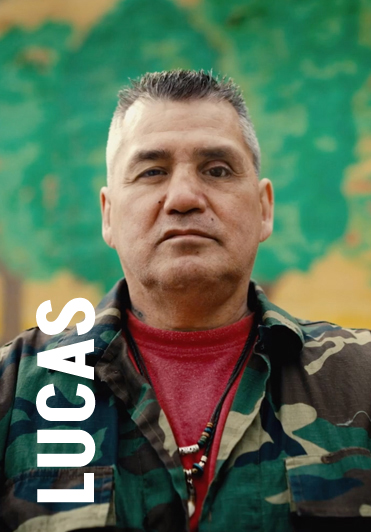
Lucas is Ojibway from the Delaware Nation of the Thames. After growing up with six brothers and his father, he was sent to prison as a young man. A six-year sentence turned to thirteen and then to sixteen until thirty-three years later, he was released. A lifetime of incarceration. A lifetime of institutionalization.
He participated in the Na-Me-Res Native Inmate Liaison Outreach(NILO) program. It was from there that he found his way to Na-Me-Res. He was accepted into the transitional Sagatay residence, programs, and classes. After two short stays, followed by a successful addiction treatment program in Ottawa, Lucas was welcomed back to Sagatay for a third stay. This time has been different. He was ready. He is 19 months sober and has turned a corner.
“You stumble, you get up, and you get help. I’ve got my spirit back. Luke is back.”
Every day he smudges, journals, and prays. He used to think it was a sign of weakness to be open and to talk. That is no more, as the rest of the guys will attest. He has come a long way and is now preparing to find a new job and a permanent home